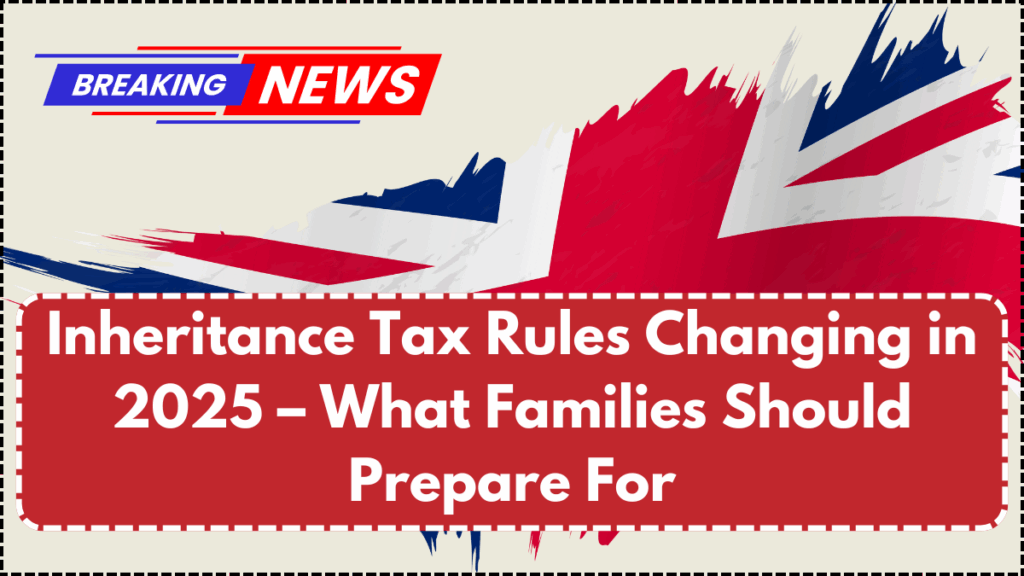Starting May 2025, the UK government will implement significant updates to inheritance tax (IHT) policies. These new inheritance tax rules UK 2025 are part of broader estate tax changes aimed at modernising outdated thresholds and addressing wealth inequality. Families should review their current estate planning strategies immediately to avoid surprises when the changes come into effect.

Key Changes Families Should Understand
Several adjustments will be introduced in 2025. Here’s a breakdown:
Change Area | Current (2024) | From May 2025 |
|---|---|---|
Nil-rate band | £325,000 | £400,000 |
Residence nil-rate band | £175,000 | £200,000 |
Inheritance tax rate | 40% | Unchanged |
Lifetime gifts exemption | £3,000 annually | £6,000 annually |
Reporting threshold | £250,000 | £500,000 |
These changes offer both opportunities and potential pitfalls. The increased nil-rate band and residence allowance mean more estates will fall below taxable thresholds. However, complex reporting requirements and changes in exemptions could lead to compliance issues for unprepared families.
How These Estate Tax Changes Affect Family Inheritance UK
The upcoming estate tax changes mean more families could transfer wealth without incurring inheritance tax. The raised thresholds especially benefit middle-income households who previously sat just above the tax line. That said, wealthier families may still face hefty tax bills if they don’t optimise their estate structures.
Family inheritance UK strategies should now focus on lifetime giving, using new exemption allowances to reduce taxable estate size over time. Discretionary trusts may also see increased use due to more favourable treatment under the new regime. Families should consider legal and financial advice to ensure every avenue is explored.
Practical Steps Families Should Take in 2025
To prepare for the new inheritance tax rules UK 2025, families should act now:
- Update Your Will: Ensure your will reflects the latest tax allowances.
- Use Annual Gift Allowances: With the limit rising to £6,000, regular gifting can ease future tax burdens.
- Review Property Ownership: Joint ownership, gifting property, or using trusts may minimise exposure.
- Consider Life Insurance Policies: These can be used to offset future tax liabilities.
- Speak to an Estate Planner: A qualified advisor can help tailor a plan that fits your family’s circumstances.
The goal is to ensure assets pass on as efficiently as possible, with minimal tax erosion.
Why Timing Matters: The May 2025 Deadline
Waiting until the changes take effect may be too late. Many strategies require time to implement, especially those involving trusts, gifting, or life insurance. Starting early in May 2025 allows families to maximise new allowances without rushing critical decisions. Planning now ensures that families stay compliant and fully benefit from the reforms.
Conclusion
The new inheritance tax rules UK 2025 mark a major shift in how wealth is passed down. These estate tax changes offer opportunities for smart planning, especially for those with property or assets approaching the new thresholds. Families should act swiftly and strategically to take full advantage of the new allowances and ensure their legacy is protected.
FAQ
What is changing in the UK inheritance tax rules in 2025?
The nil-rate band increases to £400,000, residence nil-rate band to £200,000, and annual gifting exemption doubles to £6,000.
Will the inheritance tax rate change in 2025?
No, the 40% rate remains the same. However, fewer estates will qualify for this tax due to the raised thresholds.
How do these changes affect family inheritance UK planning?
More families will benefit from tax-free transfers, but planning is still essential to avoid unnecessary tax exposure.
When should families start planning for the new rules?
Right away. Delays could lead to missed opportunities. May 2025 is the ideal time to reassess your estate plan.
Are trusts still useful under the new inheritance tax rules?
Yes. Trusts remain a powerful tool for managing family inheritance UK, especially under the new gifting rules.
Click here to learn more
